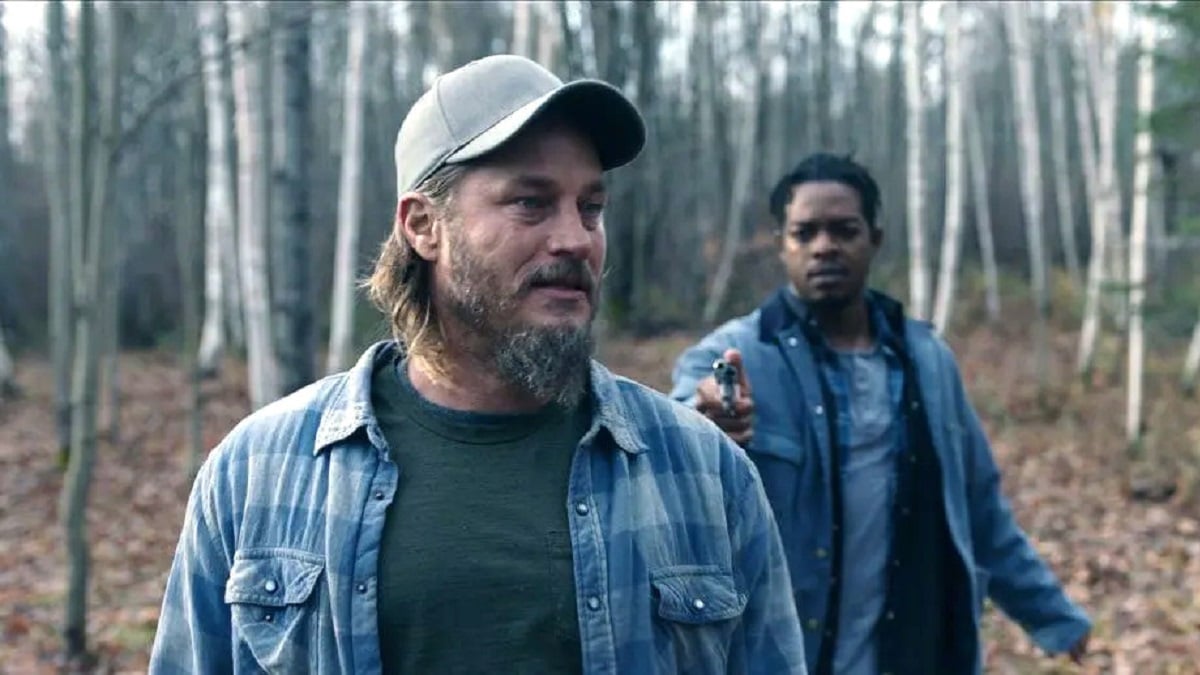It might sound like stating the obvious, but sometimes the best way to elevate motion picture material is to simply sit back and let the actors act. A raft of stellar performances can often drag a film up to the level of commitment and effort being put in by the cast, something that’s very true of Robert Budreau’s slow-burning crime drama Delia’s Gone, which comes to theaters tomorrow, before hitting VOD on September 9.
That’s not to say it’s a terrible movie by any stretch of the imagination, but the adaptation of Michael Hamblin’s short story Caged Bird Sing (which takes its title from the Johnny Cash song of the same name, which was itself a cover of the Blind Willie McTell original that plays over the end credits) can never really settle on a consistent tone, and that imbalance can often be felt several times in the space of the same scene.
Golden Globe-nominated Homecoming star Stephan James headlines the cast as Louis, who was left with intellectual disabilities after a childhood accident. He’s spent his entire life living with older sister Delia, as played by Genelle Williams. Struggling to make ends meet in a run-down rural community, petty crime keeps the siblings afloat until their lives come crashing down around them, both figuratively and literally.
Louis is furious when he discovers Delia is poised to pack up and leave town in order to find work, so he drowns his sorrows in alcohol, even though he knows fine well that “it makes him mean”. Sure enough, he wakes up the following morning to discover his sister lying face-down dead on the floor, right when the police arrive at the front door to question her about her illicit activities.

At this stage, Delia’s Gone may lull you into a false sense of security, when countless titles cut from a similar cloth have followed either the rousing courtroom revelation, the exoneration of the wrongly-accused, or fugitives going on the lam to prove their innocence. Instead, we fast forward seven years to Louis having served his sentence for voluntary manslaughter before moving to a voluntary care facility, even though he’s known all along that he’s innocent.
However, one single brief encounter with Travis Fimmel’s Stacker reignited Louis’ fire, setting him off on a journey to uncover the truth behind Delia’s death. Along the way, we’re introduced to a pair of bickering cops played by the always-reliable Marisa Tomei and Paul Walter Hauser, several criss-crossing interpersonal dynamics, and an unstoppably determined protagonist who only has a single goal in mind. one that he’s poised to achieve by any means necessary.
Individually, you’ve tasted all of these ingredients before, and while it’s admirable that writer/director Budreau attempts to spin a different kind of yarn to the one you might be expecting, it doesn’t always hit the mark. It’s never anything less than solid on a visual and technical level, so Delia’s Gone can’t be faulted when it comes to creating an atmosphere that cultivates an unnerving sense of dread, but there’s at least a couple too many threads being pulled in different directions at the same time.
Thankfully, though, the cast are more than willing to step up to the plate and deliver. In the wrong hands, Louis could have ended up anywhere between over-acting and an offensive caricature, but James always ensures that by not leaning too heavily into tics and affectations while still conveying all of the necessary emotional beats, his work is always performative without being on-the-nose.

Tomei’s Fran and Hauser’s Bo have a complicated dynamic to put it lightly, with the constant power struggle between them established as being personal, professional, and even sexual. We’re never sure where we stand whenever the two are in the same scene, and while a large part of that is by design, a couple of their exchanges stumble on the tonal tightrope by simply throwing every possible permutation into the mix and letting it play out from shot-to-shot, and it feels off as a result.
There aren’t many surprises to be found along the way, either, but that doesn’t harm Delia’s Gone in the grand scheme of things. There’s absolutely nothing wrong with telling a story that runs from point A to C by taking a detour off to B, especially when there are a quartet of sturdy turns driving the narrative forward.
The drawback is that Burdreau’s script can never decide on steady thematic ground, and the wobbles on such shaky subtextual bearings can be felt throughout. Is it a story about an innocent man seeking revenge for a crime he didn’t commit? A metaphor for dealing with grief as told through the eyes of someone who struggles with metaphors? A conspiracy thriller set in the backwoods? A languid whodunnit that reveals itself as things progress from the first to third acts? A family drama illustrating how different the bonds can be between clans, and just how far they’d go to keep them intact?
The answer is all of the above, but the disparate strands can never quite form into a whole that’s cohesive enough to come across as riveting. As mentioned previously, the effort put forth by James, Tomei, Hauser, and Fimmel just about carries Delia’s Gone over the finish line, which offsets the overall lack of a laser-focused singular method of storytelling that would have improved things exponentially.
Fair
'Delia's Gone' takes a slow-burning and tonally jumbled approach to the crime drama, but it's the performances of the cast that end up salvaging the material.
Review: 'Delia's Gone' just about gets by on the strength of its performances

